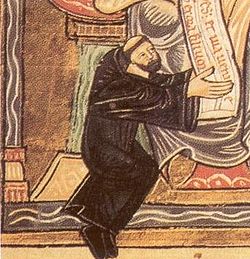Odo of Cluny | |
|---|---|
 Odo of Cluny, 11th century miniature | |
| Abbot | |
| Born | c. 878[1] Le Mans, France |
| Died | 18 November 942 Tours, France |
| Venerated in | Roman Catholic Church Eastern Orthodox Church[2][3][4] |
| Feast | 18 November 11 May |
| Patronage | Musicians, for rain, against drought |
Odo of Cluny (French: Odon) (c. 878 – 18 November 942) was the second abbot of Cluny.
Born to a noble family, he served as a page at the court of Aquitaine. He became a canon of the Church of St. Martin in Tours, and continued his education in Paris under Remigius of Auxerre. Upon returning to Tours, Odo became disillusioned with the life of a canon and subsequently entered the Benedictine abbey at Baume, where he became superior of the abbey school.
Odo joined Abbot Berno at Cluny and when Berno died in 927, was elected his successor. While abbot, he also managed the priory at Romainmôtier. Next, he undertook the reform of Fleury Abbey. He encouraged the monks to adhere more closely to the original Rule of Saint Benedict. In 931 the Pope authorized Odo to continue his work in the monasteries of Aquitaine. He enacted the various Cluniac Reforms of France and Italy. In 937, he went to Rome and was given Saint Paul Outside the Walls. He also sent his aides to Monte Cassino and Subiaco .
Odo initiated the practice among the monasteries following Cluny to hold an annual commemoration of all the faithful departed on the day after All Saints' Day.[5]
He is venerated as a saint by the Catholic and Eastern Orthodox Churches. His feast day is 18 November.
There is only one contemporary biography of him, the Vita Odonis written by John of Salerno.
- ^ Brockett, Clyde; Huglo, Michel (2001). "Odo of Cluny". Grove Music Online. Oxford: Oxford University Press. doi:10.1093/gmo/9781561592630.article.20255. ISBN 978-1-56159-263-0. Retrieved 9 July 2021. (subscription or UK public library membership required)
- ^ December 1 / November 18. https://www.holytrinityorthodox.com/htc/orthodox-calendar/
- ^ "November 18, Feast of St. Odo of Cluny". 18 November 2023.
- ^ A Western Rite Orthodox Martyrology, p. 212. https://www.stgregoryoc.org/publications/
- ^ Cite error: The named reference
Butlerwas invoked but never defined (see the help page).